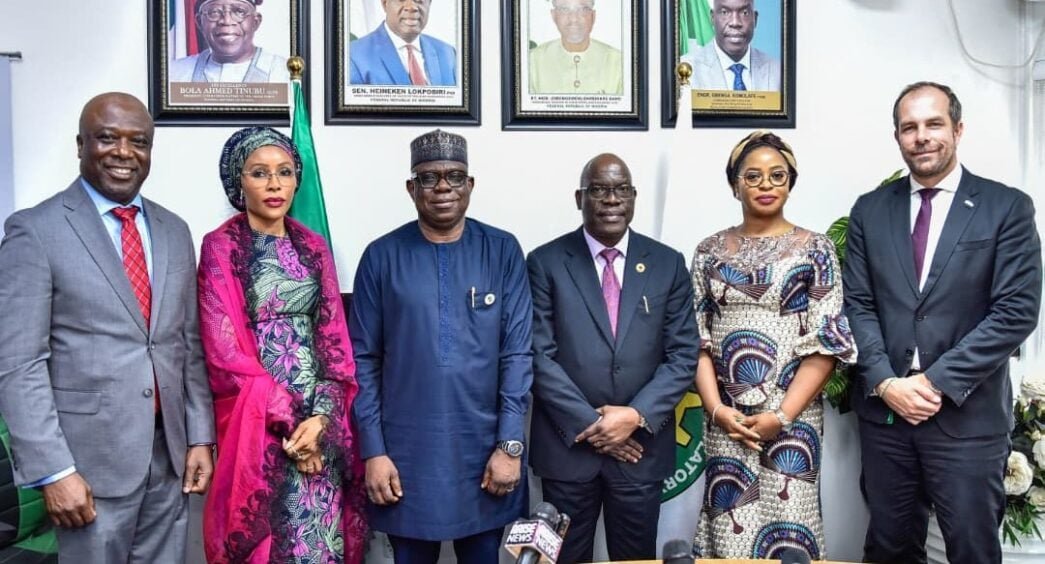The Nigerian Upstream Petroleum Regulatory Commission (NUPRC) has successfully signed the execution of a Production Sharing Contract covering Petroleum Prospecting Licences 2000 and 2001, involving Nigerian National Petroleum Company Ltd and the TotalEnergies-Sapetro Consortium.
This landmark agreement, signed at the Commission’s Abuja headquarters, represents the culmination of the 2024 Licensing Round and signals a transformative moment for Nigeria’s deep-water exploration activities.
The deal holds particular significance as it marks the first International Oil Company license award in a decade, with TotalEnergies securing 80% contractor interest alongside South Atlantic Petroleum’s 20% stake. Commission Chief Executive Engr. Gbenga Komolafe emphasized that this PSC represents “the first PSC that comprehensively covers in scope both crude oil and natural gas,” highlighting its unique dual-resource approach.
President Bola Ahmed Tinubu’s strategic 2024 Executive Orders have created a catalytic environment for this investment breakthrough. Orders 40, 41, and 42, focusing respectively on fiscal incentives, local content requirements, and cost efficiency with streamlined contract timelines, have collectively removed traditional entry barriers that previously deterred international investment.
Komolafe credited these reforms as instrumental in creating the conditions for “massive investment inflows for shared prosperity,” demonstrating how regulatory modernization can unlock Nigeria’s geological potential. The transparent, competitive bidding process aligned with Section 73 of the Petroleum Industry Act (PIA) has restored international confidence in Nigeria’s upstream sector.
The PSC structure incorporates significant financial obligations designed to ensure serious commitment from consortium partners. NNPC Group Chief Executive Officer Bashir Bayo Ojulari revealed that the agreement includes a $10 million signature bonus, alongside production bonuses of $2 million and $4 million tied to specific barrel milestones or cash payments upon reaching 35 million barrels of production.
These performance-based incentives represent a sophisticated risk-sharing mechanism that aligns operator interests with national objectives. The contract also mandates comprehensive guarantees for decommissioning and abandonment obligations, environmental remediation funding, and a defined minimum work programme with performance assurances.
TotalEnergies Managing Director Mathieu Bouyer emphasized the consortium’s commitment to “progress swiftly and responsibly with the implementation of the agreed work programme,” with plans to spud their first well “in the shortest possible timeframe.” This urgency reflects the strategic importance of Nigeria’s unexplored deep-water acreage, particularly for non-associated gas development.
The deep-water focus addresses a critical gap in Nigeria’s energy portfolio, with Ojulari noting that “tapping non-associated gas in the deep water is one of the areas the industry needs to push the frontiers.” This approach supports Nigeria’s ambitious target of reaching three million barrels per day production and attracting $60 billion in additional investments by 2030.
The NUPRC’s enforcement of the drill-or-drop policy represents a fundamental shift toward accountability in license management. Komolafe clearly stated that “unexplored acreages are expected to be relinquished apart from the clear terms of the award itself,” establishing a framework that prevents license warehousing and ensures active exploration.
This policy alignment with PIA provisions and creates a “use it or lose it” environment that maximizes the productive utilization of Nigeria’s petroleum resources. The approach demonstrates NUPRC’s commitment to maintaining a level playing field while reducing regulatory uncertainty for serious operators willing to commit substantial resources to exploration and development activities.

